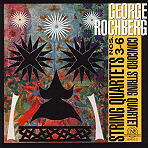The world premiere of George Rochberg’s’s 1972 Third Quartet caused a stir in critical and academic circles. Here was a highly respected and much commissioned modernist composer who always could be counted on to deliver the goods. Midway through the work, without warning, the music’s jagged motives and steel-edged counterpoints gave way to the language of Haydn and Schubert. Not momentary glimpses, mind you, but pages and pages. Five years later Rochberg pushed stylistic dichotomy to the proverbial max in his “Concord Trilogy”, comprising Quartets Four through Six. The effect is analogous to inserting paragraphs of Jane Austen in the middle of a Paul Auster novel. Rehearing these quartets after many years only reinforces my feeling that Rochberg’s own voice fades away when the old masters take over. By contrast, the late Alfred Schnittke’s more blatant polystilism adds to a more personal, albeit uneven style. What cannot be denied, though, is Rochberg’s exquisite, idiomatic string writing, plus his unerring command of form and time scale. Moreover, the recordings remind us that the long and sadly defunct Concord String Quartet was a valuable friend to new music. Its finely honed ensemble playing is charged with a sense of discovery that often comes from tackling scores when the ink is still wet on the page. Committed performances like these deserve the highest possible rating. Kudos to New World for its splendid transfers from the original Nonesuch and RCA Red Seal master tapes. [12/13/1999]
































